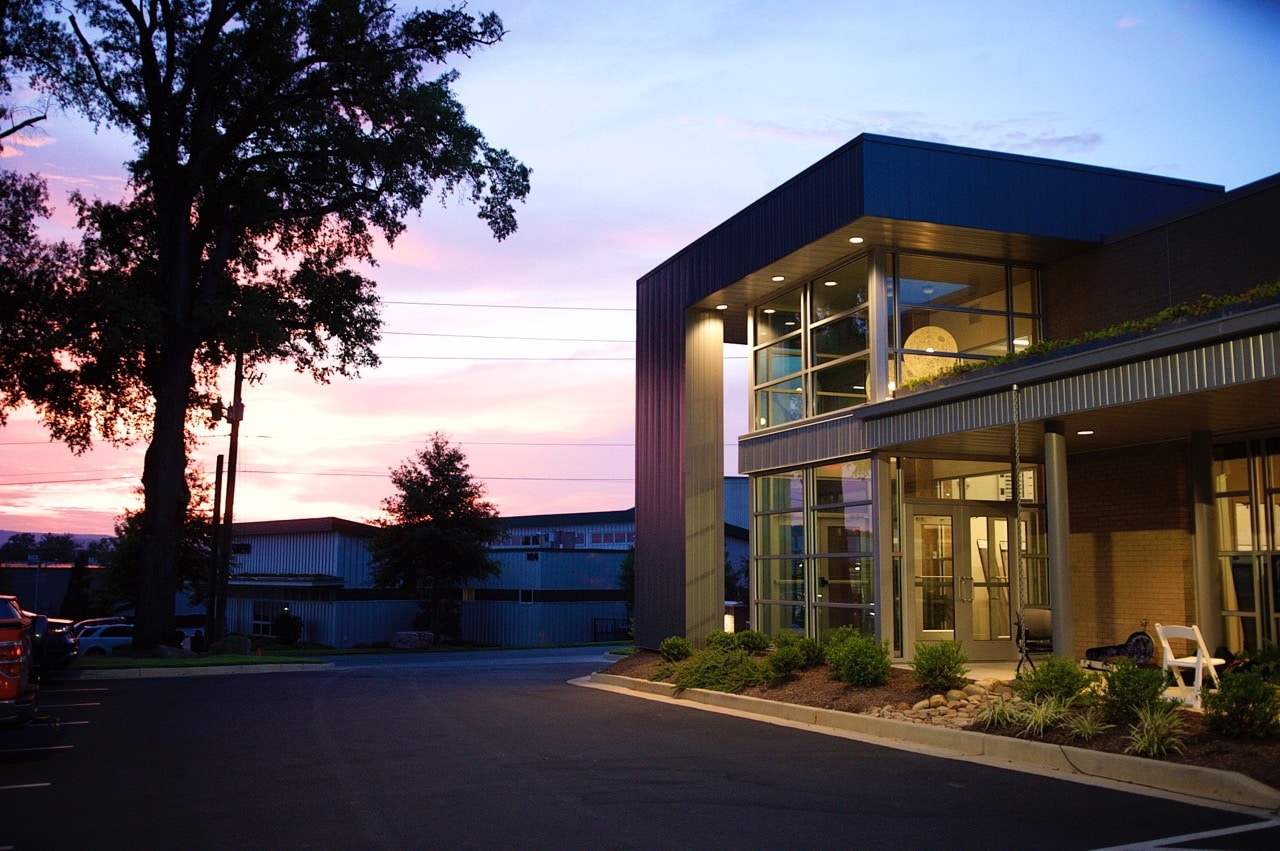
Halstead International and Metroflor Corp. in Calhoun, Ga, received the prestigious Green Globes Certification for its Innovation & Design Center.
Thanks to Metroflor-Halstead’s carefully crafted business ecosystem, sustainable, non-toxic flooring materials are here to stay
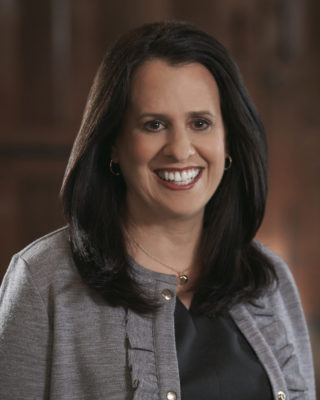
Rochelle Routman, LEED AP O+M Chief Sustainability Officer at Halstead International and MetroFlor
Rochelle Routman is hard to impress when it comes the latest green building technologies or foot-thick sustainability reports. The former chair of the Georgia Power Sustainability Working Group, a Living Building Challenge Ambassador—and named by gb&d the as one of the Top 10 Women in Sustainability in 2014—Routman has worked in the green industry for over 30 years, across a variety of product types. One-off showcase sustainability projects make for good PR, but she is more impressed with companies that take the long road to sustainability by embedding it in their culture and taking the time to find out what it really means in their particular context.
The Metroflor-Halstead Experience
Seeking a new challenge, earlier this year Routman made a trip to Calhoun, Georgia for an interview at the campus of Metroflor and Halstead, jointly-owned flooring companies who are becoming known more and more for their innovative production methods and forward-thinking corporate culture.
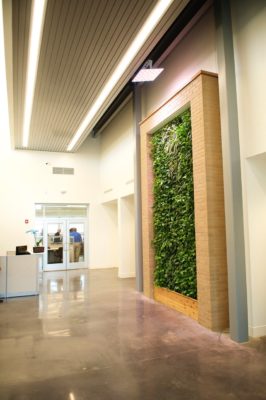
The living wall at the Innovation and Design Center.
“One of the things that really stood out for me in the interview process was these really beautiful buildings on the campus,” says Routman of the company’s LEED Platinum and Green Globe-certified headquarters. She sensed this was more than just another high-end corporate campus. She took a tour and saw the solar panels on the roof and the rainwater collection system that provides water for flushing toilets and landscaping purposes. A living wall greeted her in the foyer and the entire facility was decked out in exquisite artwork.
She was extremely impressed with the attention to detail, and all the little things that make life better for employees, like having an office window that can actually open to let in fresh air. “Everything I saw said to me that this company has made a very strong commitment to sustainability, which so many companies have the option to do these days, but choose not to,” says Routman. “And the beautiful art that is displayed throughout the space makes it such a nice environment to be in, but I also believe that it contributes to the creativity of the employees, which is a competitive advantage in an industry such as flooring.”
On a sultry Georgia afternoon in July, Routman came on board as the Chief Sustainability Officer. “It was a great day in our company’s history,” says Harlan Stone the CEO of Halstead and the CFO of Metroflor.
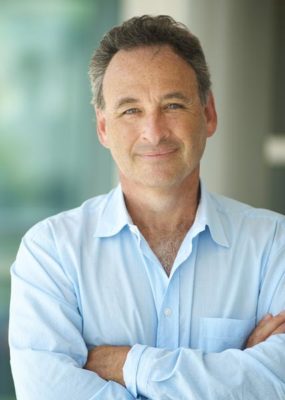
Harlan Stone the CEO of Halstead , CFO of Metroflor.
“And a great day in my life,” quips Routman. Her and Stone’s infectious camaraderie are plainly apparent as they banter back and forth on a conference call this fall. In her first two months on the job, Routman, Stone and the rest of the executive team had been busy plotting out a future that includes not only a dramatic “raising of the bar” in their sustainability program, but also a renewed emphasis on the company’s long-standing commitment to workplace diversity and inclusionary management practices, which Stone views as two other branches of the corporate sustainability tree.
“I think of myself as an open-minded CEO,” he says.
“I would have to agree with that,” Routman replies, laughing. “After all Harlan hired me.”
The China Connection
One of the first things on Routman’s agenda upon joining the company was to make a pilgrimage to their manufacturing facility in China. Acknowledging that “a lot of people have concerns about products being manufactured in Asia,” she wanted to see for herself what the conditions were like in order to feel as though she could authentically represent the company to clients and consumers back home.
A major concern among Americans when it comes to products manufactured in Asia is the potential presence of toxic compounds. Metroflor-Halstead is known as a leader in low-toxicity flooring materials, especially after becoming the first major manufacturer to eliminate ortho-phthalate plasticizers from their resilient flooring products. But that’s just the sort of claim some American consumers are prone to question when it comes to products manufactured overseas, where transparency standards are not always the same and regulations are not always enforced.
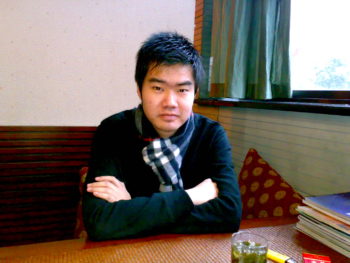
Jin Song, general manager of Elegant Plastics
Upon arriving, Routman was given a tour by Jin Song, general manager of Elegant Plastics, the company in Zhangjiangang City, Jiangsu province who manufactures for Metroflor-Halstead. “We have worked with our primary suppliers for a long time,” says Song. “But every shipment of plasticizers that we get is tested in our on-site laboratory, before it is accepted.” Outgoing shipments of flooring are also pulled on a random basis to be tested for ortho-phthalates, heavy metals, and other toxic compounds as an added measure to ensure that end-users are getting a safe product.
“I was very impressed with how modern and organized the factory is,” says Routman. She was even more impressed in the people department. “I was really struck by the positive treatment of employees there, in particular in regards to their care for the children of working families.”
A high percentage of the 1100 employees at Elegant Plastics come from far off provinces seeking work, a common dynamic in China’s rapidly industrializing economy. The problem, of course, is that the constant flux of immigration rips families apart. Often, one or both parents leave their homes for factory jobs far away, leaving children behind with a single parent or relatives. One reason for this is because, unlike in the United States, there is no guarantee that children showing up in a new city will be admitted to local schools.
Seeking to create a more stable and healthy lifestyle for their employees, Elegant Plastics makes an annual contribution to a school near the factory which enables the school to accept more students. More than 50% of the employees at Elegant Plastics have been with the company for at least 10 years and most have relocated their entire family to Zhangjiangang City.
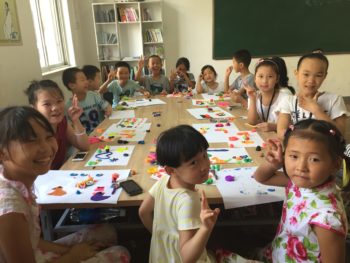
The 25-year-old factory is more like a campus—or, you might say, a village—rather than just a place of employment. Everyone is taken care of, providing stability for the families, which in turn provides stability for the company.
The company provides daycare for younger children on-site, as well as afterschool care so the parents can work through the afternoon without having to go pick up their kids. Four high quality meals are served in the company cafeteria daily, and there is a “staff club,” says Song, with a library, movie room, and Internet access available to everyone, which is particularly popular in the evenings and on weekends among single employees. There are even a number of apartments available to working families on-site.
The 25-year-old factory is more like a campus—or, you might say, a village—rather than just a place of employment. Everyone is taken care of, providing stability for the families, which in turn provides stability for the company.
Song says the nearly 20 year-long relationship between Elegant Plastics and Halstead is part of what makes such high standards possible. “When we first started working together in 1998 we were both very small companies, and we have both have grown a lot. We’ve helped each other to build our businesses through a very strong relationship focused on innovation.”
Recent years have brought many upgrades to the facilities and machinery, which are typically designed to benefit employee experience, productivity, and energy efficiency, simultaneously. The air-conditioning installed throughout the workshops a couple years ago was much applauded by Elegant Plastics’ workers, and has undoubtedly encouraged greater product yield per employee—not insignificantly in such a hot climate, the air conditioning is powered with an alternative energy source. Much of the materials handling is now automated, so machines do most of the heavy lifting, rather than the workers. There is also a new IT system where employees can track their productivity and pay in a way that is transparent and self-motivating.
“We are continually working on saving energy, improving working conditions, and using newer, safer materials,” says Song. “We try to be creative in how we pursue innovation and create a safer product for our customers.”
The Inner Workings of an Industry Leader
Metroflor-Halstead is getting in the commercial flooring game more and more, as architects and specifiers, especially those of an environmentally-conscious persuasion, latch on to their durable, beautifully-designed, low toxicity products. Routman reports that a number of Health Product Declarations and Declare Labels are now in place for the company’s products, and that more can be expected soon.
In the retail flooring market, however, Metroflor-Halstead brands, such as Konecto, Engage, Aspecta, Engage Genesis with ISOCORE, and Allure, have long held the spotlight for their environmentally-friendly qualities. Home Depot, with whom Halstead has a three decades long relationship, is one of their biggest customers.
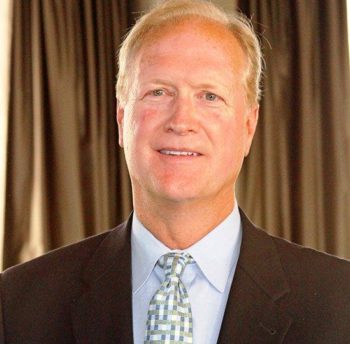
Ron Jarvis, Home Depot’s chief sustainability officer.
Ron Jarvis, Home Depot’s chief sustainability officer, says that Metroflor-Halstead played a key role in catalyzing the fast-moving phase-out of ortho-phthalates throughout the industry over the last couple of years. The process began, he explains, through a series of conversations stretching back to 2013.
“We have a group of scientists that we occasionally bring in from throughout the industry to discuss different categories of products that Home Depot has. I tell them: ‘if we switched jobs, and suddenly you were the head sustainability guy at Home Depot, which categories would you go after?’ One that kept rising to the top was the ability to remove ortho-phthalates in vinyl flooring. We talked to our suppliers—I think there were six at the time—and asked them how fast they could get there.”
Harlan Stone jumped at the opportunity. He knew there were other plasticizers out there that can be used without causing performance issues with the product. The main reason they weren’t being used is because they were more expensive. “35 years ago everybody used a plasticizer known in Asia as DOP, or in America has DEHP,” he says. “When we made the decision to convert to DOTP, the non-ortho-phthalate plasticizer, we had enough buying power to drive the cost down to an affordable level. Frankly, everybody can buy it now.”
Metroflor-Halstead’s leadership and transparency has benefited Home Depot customers immensely. Since January 1st of 2016, none of the vinyl flooring on Home Depot shelves contain ortho-phthalates. “For us, it’s all about getting ahead of the game,” says Jarvis. “We are currently working on similar initiatives in two other industries. The goal is to always make these substitutions cost-neutral, so it’s not the consumers who end up feeling the pinch.”
It’s something that Stone takes deep personal pride in. “We feel we had a strong impact on that by driving demand. That’s where profitability and sustainability, both in terms of resources and in being a forward-looking enterprise, intersect. It was a very fulfilling experience for us, and for me personally. We hope to do it again and again.”
Transparency and the Importance of Relationships
Part of Stone’s enthusiasm stems from the fact that he was literally born into the company—he inherited the business from his father, who had inherited it from his father, who had inherited it from his father. “I have known nothing else since I was one-year old in my mother’s lap,” he says. Stone grew up working in his father’s Albany, New York flooring store, known at the time as Top Tile, but was drawn to Asia at a young age. In 1982 he started working for a Japanese partner of his father’s growing global flooring empire, and has never looked back.
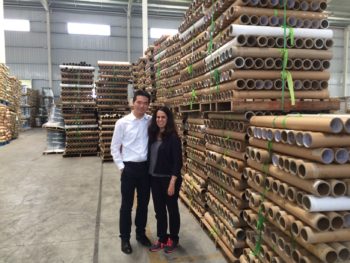
Rochelle Routman
Stone has spent his life building the family business up the supply chain from distribution to importing to manufacturing, none of which would have happened without the relationships he’s built with the company’s Asian partners over the years. “When I first started working overseas there was no manufacturing of vinyl flooring, or vinyl anything, in China,” he says. “China simply did not make PVC products. I was fortunate enough to be at the early phase of that and have spent many years developing the relationships to create this industry. Today a very high percentage of the world’s luxury vinyl tiles [Metroflor’s signature product] comes from plants in China.”
Stone met Jin Song when he was a teenager working on the floor of a state-owned factory where Jin’s father was the manager. Song’s father struck out on his own as an entrepreneur and started the company that Jin now manages. Stone doesn’t mince words when describing his thoughts about China and the business community he’s become a part of there.
“I’ve been to China more than 100 times in my life, and I know for fact that you can get very innovative, safe, and sustainable products from plants in China,” says Stone.
“That is not to say that you can’t get the same from plants in the US or Europe. But you can also get really unsafe, dishonest, and non-transparent products from China, from Europe, and from the United States. Geography has nothing at all to do with the reliability of products. It has to do with the people. This is a human business.”
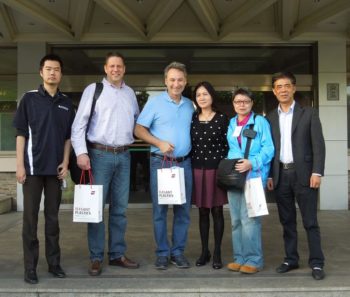
Harlan Stone on a visit to China.
Routman, chiming in, voices her wholehearted agreement, and points out how important that perspective is when it comes to product transparency. Not only did the company fly her to China to see their operations firsthand, they also flew a whole contingent of distributors to meet Song and see for themselves how the products are made. “They were all very pleasantly surprised by what they saw,” says Routman. It really opened up the eyes of our customers and made a very strong statement around transparency, and one that I believe is unmatched in the market.”
